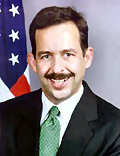 Stephen D. Mull, formerly the U.S. Ambassador to Lithuania and now the Acting Assistant Secretary for Political Military Affairs at the State Department, testified last week at the House Foreign Affairs Subcommittee’s hearing on export control. Most of the testimony was a not very convincing effort to defend the long processing times for Technical Assistance Agreements at the State Department’s Directorate of Defense Trade Controls (“DDTC”). Mull repeatedly referred to the “complexities” of TAAs to justify these processing times.
Stephen D. Mull, formerly the U.S. Ambassador to Lithuania and now the Acting Assistant Secretary for Political Military Affairs at the State Department, testified last week at the House Foreign Affairs Subcommittee’s hearing on export control. Most of the testimony was a not very convincing effort to defend the long processing times for Technical Assistance Agreements at the State Department’s Directorate of Defense Trade Controls (“DDTC”). Mull repeatedly referred to the “complexities” of TAAs to justify these processing times.
Another part of his testimony, however, suggested a possible change in procedures relating to employment by defense contractors of foreign nationals from NATO, E.U and the “plus three” countries (i.e. Japan, Australia and New Zealand):
We are set to initiate a policy change that will permit employees of foreign companies who are nationals from NATO or EU countries, Japan, Australia and New Zealand to be considered authorized under an approved license or TAA. This will alleviate the need for companies to seek non-disclosure agreements for such nationals and recognizes the low risk to of transferring technologies to nationals of these countries under an approved license or TAA.
A welcome change to be sure, but if there is such a low risk of transferring non-classified defense technologies to such nationals, why not eliminate the requirement for a DSP-5 license application for them as well?
 Permalink
Permalink
Copyright © 2007 Clif Burns. All Rights Reserved.
(No republication, syndication or use permitted without my consent.)

 Posted by
Posted by  Category:
Category: 

